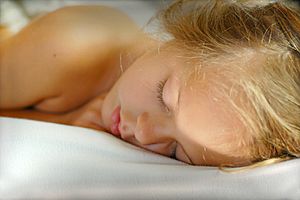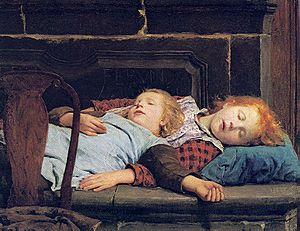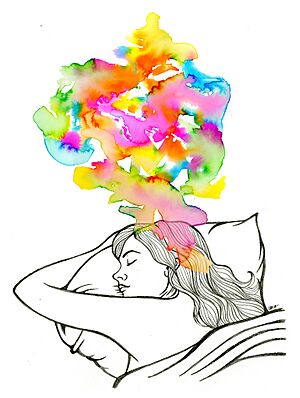Sleep facts for kids
Sleep is a natural state of rest that happens in animals, including humans. When you sleep, your body and mind are mostly unconscious. Most of the muscles you control on purpose become inactive. People who are asleep don't react to things around them as quickly as when they are awake. It's easier to wake up from sleep than from deep states like hibernation or a coma.
All mammals, birds, and many reptiles, amphibians, and fish need to sleep. For humans, other mammals, and most animals studied, getting enough sleep regularly is super important for staying alive and healthy.
Just like water and food, sleep is vital for your health and how well you feel. Humans and animals need sleep so their bodies can rest and get ready for the next day. Your daily activities, how you look, and how you express yourself all depend on getting enough sleep. If you're tired, you won't be able to do things properly. Not getting enough sleep can make it hard to remember information, change your mood, affect your health, and cause many other problems.
When you sleep, your immune system releases special compounds called cytokines. These help your body fight off infections and inflammation. If you don't get enough sleep, you won't have enough cytokines to protect you from getting sick. Also, your body won't have enough time to finish storing memories, repair muscles, and release hormones that control growth and appetite.
Scientists are still learning exactly why we sleep, but we know for sure that it's necessary for most animals to survive.
People usually sleep at night when they are not awake. During the day, most people are awake, working, going to school, or doing other things. Many people take a short nap in the early afternoon for a quick rest. A good nap should last between 15-30 minutes. Longer naps, like 30-60 minutes, can make you feel groggy and less alert.
In some warm countries, like Spain and parts of Latin America, people have a tradition called a siesta. This is a nap taken right after noon or in the early afternoon. Some stores and businesses even close while their owners or employees take their siesta.
Contents
What the Word "Sleep" Means
The word "sleep" comes from old Germanic words. In Old and Middle High German, it was called "SLAF." The original meaning was "to slap," which was related to the word "flabby" (meaning not hard or firm).
Many words related to "sleep" have different meanings today. For example, "sleep" was also used to mean death. So, "putting an animal to sleep" meant to end its life without pain.
Why We Need Sleep
Generally, sleep is important because your brain has special work to do while you're resting. We don't fully understand all the details, but getting enough sleep is crucial for your body and brain to be healthy and work correctly. Animals and people usually sleep at regular times, like once a day. Some animals even send signals to others when they are about to go to sleep. Yawning is one such signal.
Both humans and many animals sleep about once a day. However, some animals, like cats, sleep many times a day for short periods. When people sleep, they often have dreams. It's likely that some animals dream too. Not only people sleep; all mammals and birds, and most fish, reptiles, and other animals do too.
Different Kinds of Sleep
REM Sleep
In mammals and birds, sleep can be divided into two main types. One type is called REM sleep, which stands for "Rapid Eye Movement." During this phase, your eyes move quickly back and forth. Most dreams happen during REM sleep. Your brain also sends energy to your body, making your muscles very relaxed. This phase helps you feel energetic and ready for the next day.
REM sleep happens in cycles throughout the night. These periods get longer in the second half of the night. It often starts about 90 minutes after you fall asleep and then repeats every 90 minutes. REM sleep was first discovered in 1952-1953. REM sleep is found in mammals and songbirds. Scientists think this similar sleep pattern might have developed separately in these different animal groups.
NREM Sleep
The other type of sleep is called NREM sleep, which means "Non-Rapid Eye Movement." During NREM sleep, your eyes don't move rapidly, and you usually don't dream. NREM sleep has three or four stages.
- Stage I: This is the lightest sleep, like dozing off.
- Stage II: This is also light sleep. For adults, about half of their sleep time is spent in this stage.
- Stages III and IV: These are called deep sleep. Deep sleep is very important for your body to grow and heal. It can be quite hard to wake someone up who is in stage III or IV sleep. Sometimes, stages III and IV are combined and just called stage III.
Adult humans normally sleep in cycles that last about 90 to 110 minutes each. A full night's sleep can include 4 or 5 of these cycles. Each cycle usually goes through stage I, stage II, stage III (or IV), and then REM sleep.
Stages of Sleep
There are 4 main stages during sleep:
- Stage 1: This is the lightest stage of NREM (Non-Rapid Eye Movement) sleep. It's when you are just starting to fall asleep.
- Stage 2: This is the first clear stage of NREM sleep. Your breathing and heart rate become regular, your body temperature drops, and you become less aware of your surroundings.
- Stage 3: This is deep NREM sleep, where your brain produces slow waves called delta waves. It's very difficult to wake someone up during this stage because they are in a very deep sleep. Sleepwalking and sleep talking often happen in this stage.
- Stage 4: This is the dreaming stage, also known as REM (Rapid Eye Movement) sleep. Your brain waves are more active, and your eyes move rapidly. It's more common to wake up during REM sleep than during NREM sleep.
Both REM and NREM sleep patterns help your brain with long-term memory, remembering information, learning new skills, and creative thinking.
Getting Enough Sleep
People who get less than 8 hours of sleep a night often feel tired and complain more during the day. Getting the right amount of sleep is super important because it affects your body and can increase your risk of serious health problems. The recommended amount of sleep changes with age:
- Toddlers (4 to 12 months): 12 to 16 hours (including naps)
- Toddlers (1-2 years): 11 to 14 hours (including naps)
- Preschoolers (3-5 years): 10 to 13 hours (including naps)
- Grade Schoolers (6 to 12 years): 9 to 12 hours
- Teenagers (13-18 years): 8 to 10 hours
- Adults (including older adults): 7 to 9 hours
Both the timing of your sleep and how much you get are important. These can be different for different people. Some adults sleep best from 10 PM to 5 AM or 6 AM, while others sleep best from midnight to 7 AM or 8 AM. These differences are normal. Children need more sleep than adults. Newborn babies sleep about 18 hours a day. Young babies sleep many times a day and don't develop regular sleep patterns until they are 3-4 months old. By age 1, they sleep about 14 hours. Teenagers also need about 9-10 hours of sleep per day. Adults who sleep less than about 8 hours a day often don't perform as well as those who sleep longer.
Habits That Affect Sleep
Some common habits can affect your sleep schedule without you even realizing it. A few habits that can make it harder to sleep well are:
- Eating too much before bed: Your digestive system will be busy working, which can keep you awake.
- Watching TV or using screens: The bright light from screens can trick your brain into thinking it's daytime, making it hard to fall asleep.
- Drinking too much: This can make you need to use the bathroom multiple times during the night, interrupting your sleep.
- Using your phone or playing video games: The artificial light from screens stimulates your mind and body, making it hard to relax and sleep.
- Not having a bedtime routine: A regular routine helps your body know when it's time to wind down.
- Pain: Any type of pain, like back pain, joint pain, or tooth pain, can make it hard to sleep. You should get it checked out by a doctor.
- Cold feet: Keeping your feet warm can help you fall asleep more easily.
- Caffeine: Avoid caffeine, especially in the afternoon and evening, as it can keep you awake for hours.
- Stress: Stress can keep your brain active, making it hard to quiet your mind and fall asleep.
- Snoring: If you or someone you share a room with snores loudly, it can make it difficult to get quiet, restful sleep.
Sleeping Problems
Getting a good night's sleep is super important for your overall quality of life. Sometimes, people have trouble falling asleep, staying asleep, or getting enough sleep. This usually means they feel too sleepy during the day.
Many things can affect sleep. Some substances, called stimulants (like coffee), can cause poor sleep. When you've just eaten a big meal, your body is busy digesting, which can also lead to poor sleep. Worrying and stress can definitely make it hard to sleep well.
There are also many illnesses that can cause poor sleep. A fever can lead to bad dreams. Poor sleep can also be a side effect of some medications.
Sleep disorders directly affect how a person sleeps. Examples of sleep disorders include narcolepsy, sleep apnea, and circadian rhythm sleep disorders.
The 4 most common sleep disorders are:
- Insomnia: This means you have trouble falling asleep at night, often wake up in the middle of the night, wake up earlier than planned, and feel tired and moody during the day.
- Sleep Apnea: This happens when you stop breathing for several seconds while you're asleep. Your brain then wakes you up to force you to breathe harder. Because this can happen many times during the night, your body can't get deep, restful sleep, leading to fatigue.
- Restless Leg Syndrome: This is an uncontrollable urge to move your legs, especially when you're resting. This urge can make it very hard to fall asleep and stay asleep.
- Narcolepsy: This is a condition where your brain has trouble controlling your sleep and wakefulness cycles. This leads to extreme daytime sleepiness and falling asleep unexpectedly at various times.
Sleep specialists, who are doctors focused on sleep problems, often suggest better "sleep hygiene" to people with sleeping problems. Sleep hygiene means good habits you can try, such as:
- Trying to go to sleep at a similar time each night and wake up at the same time each morning (sticking to a routine).
- Avoiding strong emotions or exciting activities in the hours before sleep.
- Sleeping in a cool, quiet, and very dark place. Make sure your mattress, pillow, and blankets are comfortable.
- Avoiding bright light from screens (phones, tablets, computers) for at least an hour before bedtime.
- Eating dinner at least 3 hours before bedtime so your digestive system has time to break down the food.
- Avoiding a big meal right before bed.
- Getting enough physical exercise every day, but not too close to bedtime.
- Trying different sleeping positions. However, try to avoid sleeping on your stomach, as it can flatten the curve of your spine and lead to lower back pain.
Images for kids
-
"The Awakening", an illustration for writing by Leo Tolstoy.
-
Man napping in San Cristobal, Peru.
-
Bronze statue of Eros sleeping, from 3rd century BC to early 1st century AD.
-
The Land of Cockaigne by Pieter Bruegel the Elder, 1567.
-
The Sentry (1654) by Carel Fabritius.
-
The Sleep of Reason Produces Monsters (1799) by Francisco de Goya.
-
The Second Class Carriage (1864) by Honoré Daumier.
-
Lullaby (1875) by William-Adolphe Bouguereau.
-
Taking a Rest (1882) by Ilya Repin.
-
Flaming June (around 1895) by Frederic Leighton.
-
Noon – Rest from Work (1890) by Vincent van Gogh (after Millet).
See also
 In Spanish: Sueño para niños
In Spanish: Sueño para niños


















